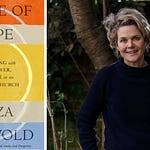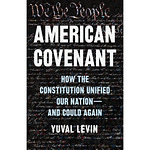hello friends,
I have never cared all that much about the debate over evolution. But I grew up in an evangelical home and church. So in my world, the origins of the species were definitely up for question.
To me, it all seemed rather silly. I didn't see any conflict between evolution and the Christian faith, or even between evolution and the Bible.
But I have known others who said quite openly that if they ever came to believe that evolution was true, they feared they would lose their faith. Most evolution skeptics aren't quite as blunt or bleak. There is a wide range of evolution skepticism, from those who simply aren't sure what to believe to those who are adamant opponents.
I had never really thought, however, about the ways that skepticism of evolution was one of the foundations of an anti-expertise, anti-science frame of mind that really does permeate evangelicalism. We saw it more clearly than ever during the COVID pandemic. But we've also seen it on the issue of climate change. The consensus of scientific evidence is clear, but religious conservatives reject it, or say we can't know what's true.
Janet Kellogg Ray is a biology professor at the University of North Texas. She was raised a creationist, and has written two books now about the issue of evolution and evangelicals. The first, Baby Dinosaurs on the Ark? The Bible and Modern Science and the Trouble of Making It All Fit, came out in 2021. The second came out this month. It's called The God of Monkey Science: People of Faith in a Modern Scientific World.
Here is a partial transcript of our conversation. If you want to hear the full conversation, you can listen to it here on the Substack podcast player today, or at The Long Game podcast on all podcast platforms tomorrow when it goes live there.
Jon: What is the audience here? Is it mostly aimed at religious conservatives or is it mostly aimed at explaining those religious conservatives to people who are not that type of person?
Janet Kellog Ray: I honestly think it's some of all of that. I think it's explaining evangelicals to evangelicals because I don't think evangelicals quite see themselves as those outside that world see them. I think evangelicalism has become so insular that many do not have an understanding of how they are viewed outside of those evangelical walls.
I want to explain evangelicals to those outside the world. And honestly, one of my goals with all of my writing — the first book and with this one also — is that I want to make the complex accessible. I don't write to the scientist. And I know from my own background when I first started having, and I can't even call them questions about evolution, because honestly, I did not even have the vocabulary to formulate a question.
So one thing that I want to do with my writing, my speaking, is to give people a vocabulary. Because I know in my own experience, there were years where I felt a disconnect, a discomfort between what I was learning as a science major and what I was taught in my religious tradition, but I literally did not have the vocabulary to express those thoughts, those questions.
Jon: Explain your backstory and the arc of how you got to where you are now, and what you do day in, day out.
JKR: I was raised in the mainstream churches of Christ, a very conservative, many would say fundamentalist group. We took the Bible very seriously and we took it very literally. But church was very central to my growing up, to my family life. We went to church three times a week. A lot of people did. And so for the most part, it was a positive experience for me. The growing up in my experience with church, I remember the very distinctly the first time that I felt uncomfortable with what I was teaching at church and what I was learning, being taught at church. And I just want to make the point, I never remember hearing evolution or science denigrated from the pulpit because young Earth creationism was just the default.
And so I didn't grow up hearing a lot about evolution, but when I was in seventh grade, I was starting a brand new school ... It was an amazing [science] class for a seventh grade class. We went through what we call the animal kingdom. At the time we did real dissections. And the more we dissected and the more I studied, I distinctly remember having thoughts: 'These animals sure do seem connected in some way. It sure seems like these systems are just modifications from simpler systems in simpler animals to more complex systems built on some of the same parts and pieces and functioning.' But I had absolutely no vocabulary to express anything like that.
I've been at the same university now for 18 years [The University of North Texas], teaching science majors and non-majors ... along the way, I started writing a blog, speaking when I could.
Jon: So your book is about some of the effects of evolution denial in evangelical culture, and it's about the origin story of how that came about, how that disbelief and evolution came about, which you trace back to the Scopes trial, which is a fairly widely held view. Was there a political element to the Scopes trial where political forces were pushing to mobilize or to utilize evangelic or conservative religious folks for some reason through this issue?
JKR: That's a great question, and I've never thought about it through the lens of was it a political force? But I think absolutely because the Scopes trial [was] in the mid 1920s. It's kind of a mystery, because Darwin's work had been published for decades before that. Why 1925? Why did it all come to a crisis in 1925 when Darwin's work had been around since the 1850s?
When [William Jennings] Bryan made his point about evolution, he had three major talking points. He said, there's no evidence for evolution, and even scientists don't support it.
Bryan characterized those that support evolution as enemies of the Bible.
And finally, and this is a big one, Bryan said that because those who oppose evolution are in the majority, their rights are being violated when it's taught in public schools.
So fast forward through the rest of the century into the 21st century, and we can still see basically argument fossils, embedded in opposition to climate science, opposition to all things COVID. We still see Bryan's game plan there: 'The science is always overblown, or there's not really evidence for it.' 'Science threatens our faith.' Oh, that's a big one. But the huge one, I think that's a fallout from Bryan's arguments is that acceptance of science, evidence, whatever it is before us at the time, comes at a cost of personal rights and freedoms. We've taken that same outline and we've just tweaked it a bit, retooled it and launched it for another day in the 21st century.
Jon: What is a good book or the best book that you know of about the Scopes trial?
JKR: Oh, my favorite. It's not a sit down read, but Summer for the Gods is my favorite.
Jon: You're arguing that the Scopes trial and denial of evolution was a major break between evangelicalism and science. Is it the major break? I'm not a historian of these kinds of issues. Were there other ones decades or centuries before? How much of a right or turn was this?
JKR: Well, everybody wants to point to the Galileo incident, and that was important, but the Galileo incident did not have nearly the shockwaves sent through the world that the Scopes trial did. In God of Monkey Science, I call it just the perfect storm here. At the same time that Darwin was writing, you had theologians primarily in Germany who were investigating the Bible and the historical context of the Bible, and it's typically referred to as historical biblical criticism.
And so you have theologians, you have scholars saying for the first time, that the Bible perhaps is not the actual dictated words from the very mouth of God. And these guys were writing at the same time that Darwin was writing. And so about the same time that Darwin and evolution became something that the common man, the non-scientists began to be conversant about, you're also seeing the influence from this historical biblical criticism.
And it just comes to this perfect storm at the beginning of the 20th century where you have, on one hand, these scholars in their ivory towers telling us the Bible is not what we always thought it was. And then on the other hand, you're having a scientist telling us that we came from monkeys. And so it's this perfect storm coming together. And we saw shock waves through the evangelical group in particular, but not just evangelicals initially in trying to wall ourselves off from this attack as it was seen on the Bible, and then attack on humanity as evolution was seen this demeaning attack on humanity. So you see from that point on, you see this development of this very insular, siloed world with evangelicals where we drew up the drawbridges and we created our own universities, our own seminaries, our own media, our own music industry, our own publishing industry. And so you could go from preschool to a doctoral degree and never leave an evangelical educational institution. You could read books, you could publish books and never go beyond the evangelical world.
Jon: There are two words that I think are important to focus on at this point. One of them is the word theory, and the other word is consensus. Maybe you can tie into consensus after you go to the issue of theory: what does that word mean? How is it used in the scientific community and how is it used in the religious conservative community?
JKR: Great question. When scientists use the word theory, a theory is something that is foundational to an entire field of science. Atomic theory is foundational to chemistry. Can you imagine doing chemistry without atoms? That's how foundational atomic theory is. Gravitational theory, germ theory, evolution theory. When a concept or a hypothesis is supported, time and time and time and time and time again over decades by multiple researchers across the globe, then a hypothesis will reach the status of a science theory.
Science theories are explanatory and they are predictive. Unfortunately, we misunderstand how scientists use the word theory because the way we use theory in our everyday life is not the way scientists use theory. I mean, I tell my students every semester, my theory is that my Dallas Cowboys are going to win at all this year, but that's probably just wishful thinking. And it's not how scientists talk about a theory.
A theory is something about which scientists are quite certain. So if you were going to make a hierarchy of terminology and you've got laws and you've got facts, and you've got theory, well theory is going to rank above all of them because it's theories that make sense of the laws and the facts that we observe.
So there are still states to this day and school districts to this day that require stickers to be put on textbooks that say evolution is just a theory as if it was just somebody's idea. And once again, your idea is just as good as my idea. But I don't think anyone would say to their surgeon, don't worry about washing your hands or sterilizing your instrument today, because germ theory is just a theory. No one would say that no one would jump out of an airplane without a parachute, because gravity is just a theory.
And you also ask about what do we mean by scientific consensus? Well, I think once again, outside of a scientific community, I think there is this idea that all the scientists get together and just raise their hands and vote about what they think is the right answer to the question. But actually, when we're talking about scientific consensus, we're talking about consensus of the evidence that when you look at all of the evidence taken as a whole — not someone's opinion, not someone's best idea — that if you look at all the evidence taken as a whole, what is the consensus of the evidence? It's not based on a vote by people, by the scientists. It's based on what the evidence shows.
The Catchup
If you want a quick 10-minute read to catch up on what happened — so you can get on with your life and your weekend — I'm doing that each Friday. It's focused on substance rather than hype, with links to go deeper if you want. Here's an efficient, substantive summary of what's happened in Israel, in Congress, and in presidential race, at this link. There are links to stories to take you deeper on each story if you want.
Interesting reads
Why You Don’t Need to Rake Leaves by Remy Tumin for The New York Times
What We Can Do to Make American Politics Less Dysfunctional by Yuval Levin for The New York Times
Perspective: Jonathan Rauch underscores ‘civic theology’ of The Church of Jesus Christ of Latter-day Saints in lecture series by Paul Edwards for The Deseret News














Share this post